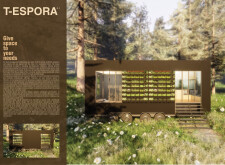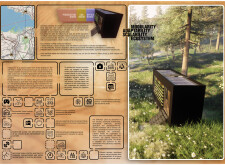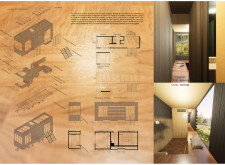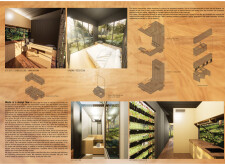5 key facts about this project
# Analytical Report on T-ESPORA 4.1 Architectural Design Project
**1. Overview**
T-ESPORA 4.1 is located in a region characterized by rich natural landscapes, designed to address contemporary challenges in modular living and sustainable design. The primary intent is to create adaptable and scalable living environments while promoting environmentally responsible practices in architecture. The project emerges from a collaborative effort among professionals in various fields, each dedicated to modern living solutions that emphasize environmental stewardship.
**2. Spatial Configuration and Functionality**
The project employs a modular design framework, allowing for flexibility in configuration to meet diverse needs, ranging from residential to communal spaces. Each habitable module serves distinct functions—such as production, office, and living areas—while remaining easily reconfigurable. Interior configurations focus on multi-functional spaces; for example, a studio/bedroom module integrates convertible furniture for optimized space usage, while a kitchen/dining module emphasizes communal interaction through modular tables and seating.
**3. Material Selection and Sustainability Features**
The material choices reflect a commitment to sustainability and performance. Wood, such as plywood and timber, is utilized for structural elements and interior finishes, supporting the use of renewable resources. The metal framework, primarily composed of steel, ensures durability while allowing lightweight designs. Large glass windows and folding doors enhance natural light and connect indoor environments with the outdoors, contributing to an improved user experience. Solar panels installed on the roof reflect the project's dedication to renewable energy, further underscoring its ecological focus.
The incorporation of features such as vertical gardens not only enhances the aesthetic appeal but also supports food production and self-sufficiency, fostering a direct connection to nature. Water reuse systems in the bathroom module exemplify advanced ecological practices essential to the project's philosophy.























































